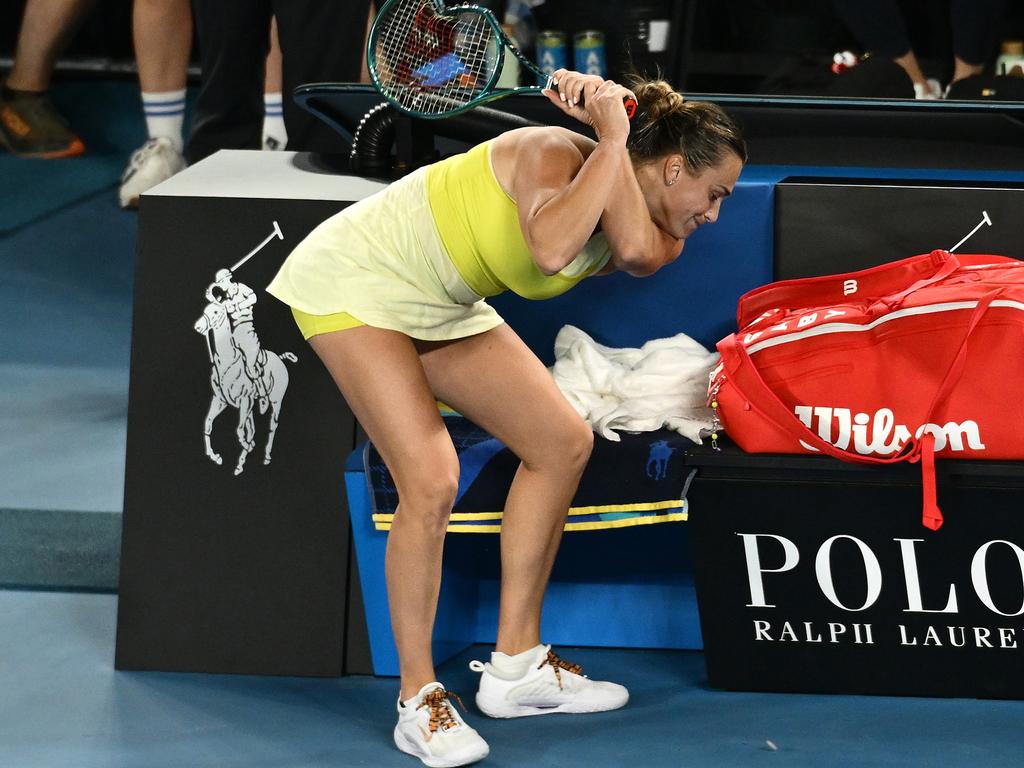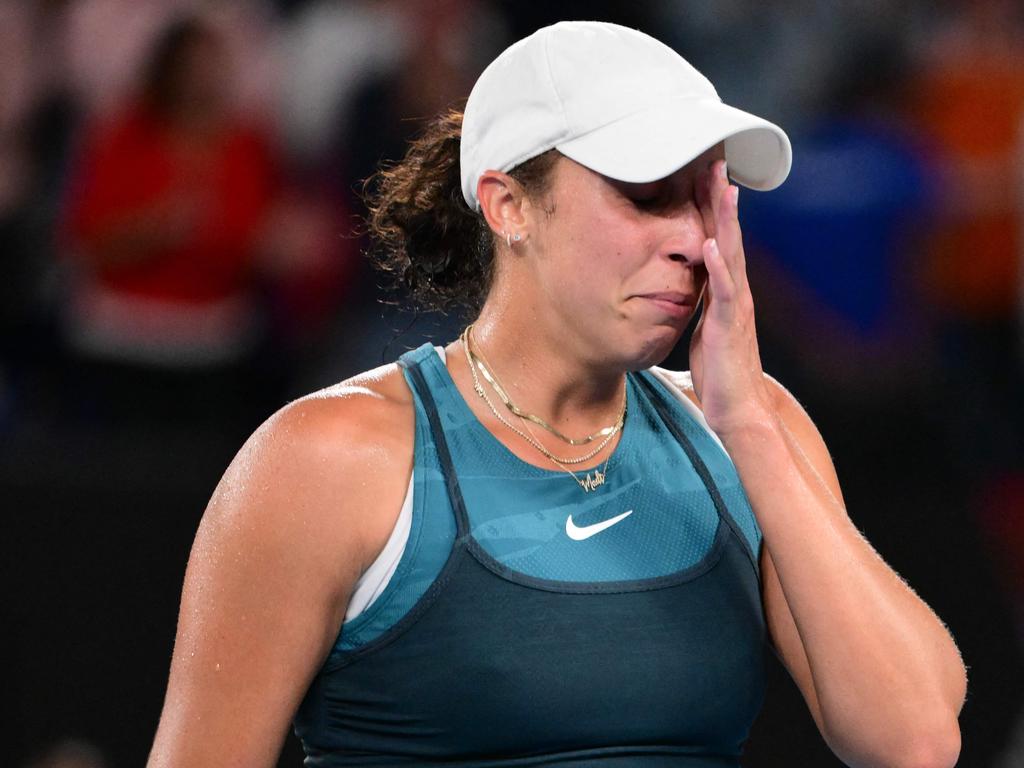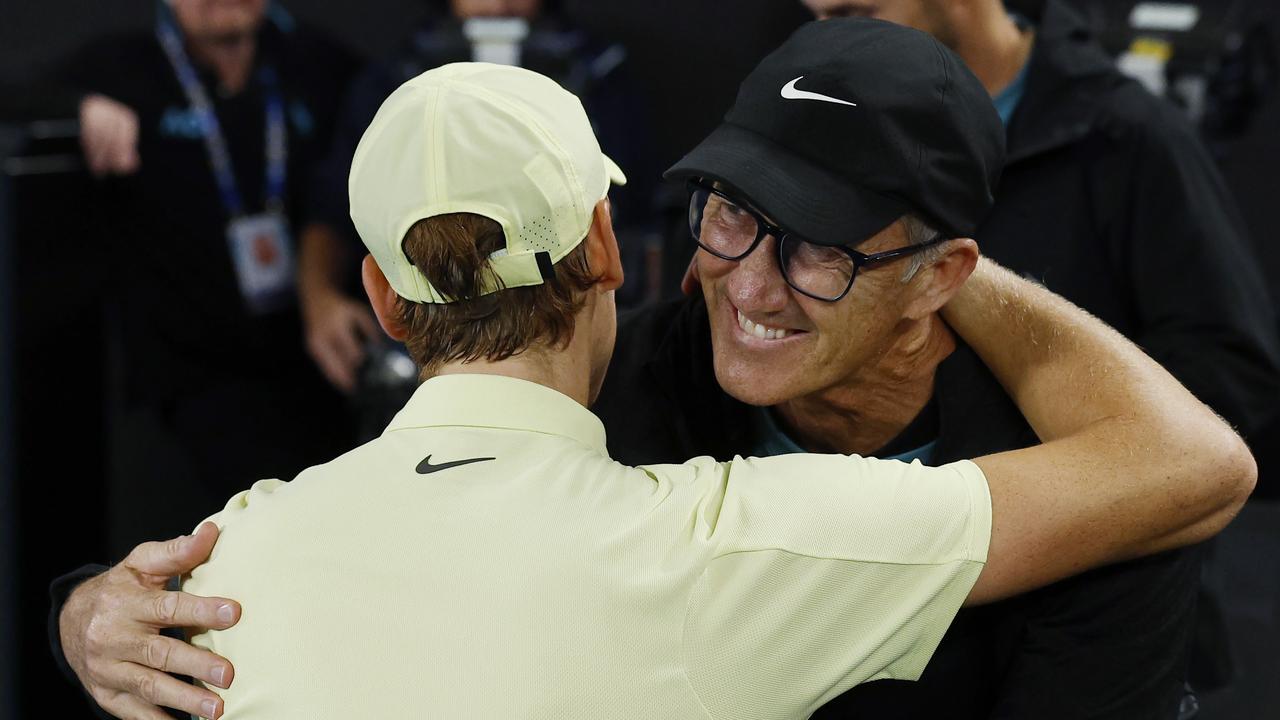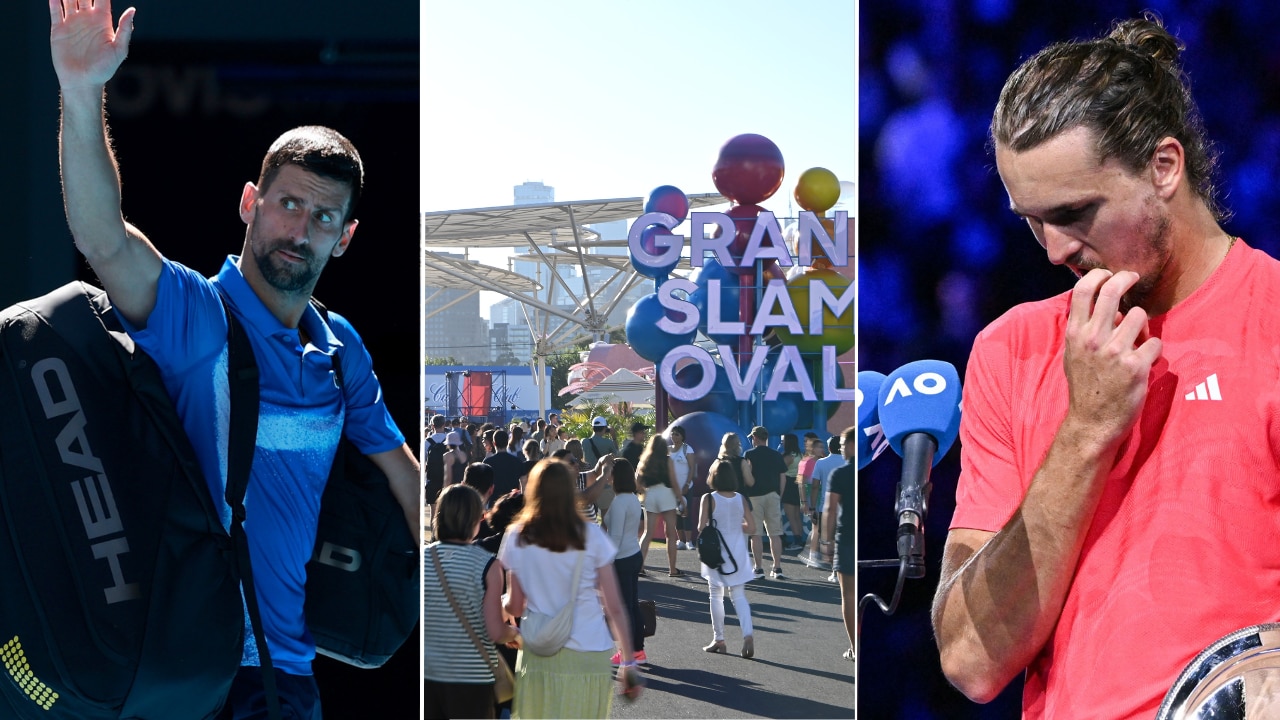Deep and meaningful: Keys finds the power of letting go through therapy
Madison Keys was told from 12, you’ll win a slam! A compliment to a kid. A complication when you’re 29 and haven’t done it. ‘I got to the point where I was okay if it didn’t happen.’ Which was when it happened.
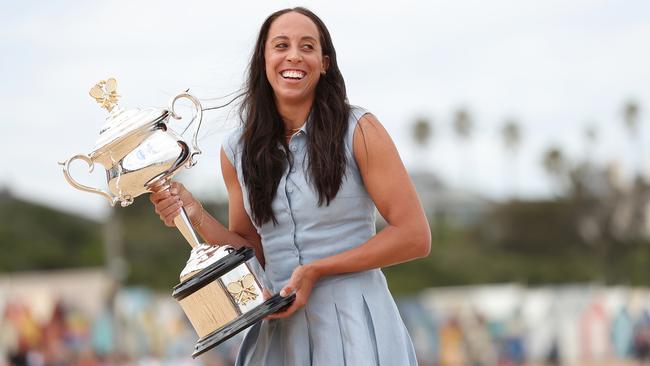
Epictetus missed his calling. Should’ve been a sports psychologist. They’d be queuing at his door. His discourses in Ancient Greece about letting go was the philosophy behind Madison Keys’s feel-good victory at the Australian Open. Her blazing forehand winner on match point was deep and powerful … and equally deep and meaningful.
Keys grabbed her first major by telling herself she no longer needed a major to feel fulfilled as an athlete and human. “Let It Go” is the thousands-years-old spiritual instruction for empowerment and self-discovery doubling as the theme song to Frozen, and you wouldn’t blame Keys for belting out the lyrics all night long at a karaoke bar on Collins Street after the American, just a few weeks shy of her 30th birthday, ending years of passivity and timidity at the slams, and feelings of failure, borne from wanting it too much, and for the wrong reasons, ripped that fearless, go-for-the-doctor forehand from the gods to beat Aryna Sabalenka 6-3 2-6 7-5.
Deep and powerful. Deep and meaningful. “I’m just really proud of myself,” Keys said.
“I didn’t always believe that I could get to this point. It means the world to me. Everything kind of happens for a reason and I think, for me specifically, I’ve had to go through some tough things.
“It forced me to look at myself in the mirror and try to work on the internal pressure I was putting on myself. I felt like, from a pretty young age, if I never won a grand slam then I wouldn’t have lived up to what people thought I should have been. That was a pretty heavy burden to carry around.”
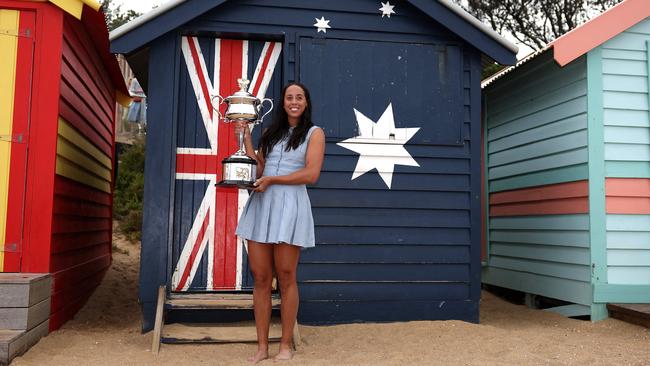
Keys was told from the age of 12, you’ll win a slam! A compliment to a kid. A complication when you’re 29 and you haven’t done it. She played the most beautiful match, a butterfly kiss of a match, a tranquil flow of effortless power and precision.
“I finally got to the point where I was proud of myself and proud of my career with or without a grand slam,” she said. “I got to the point where I was okay if it didn’t happen. I didn’t need it to feel like I had a good career or that I deserved to be talked about as a great tennis player.
“I feel like finally letting go of that kind of internal talk gave me the ability to actually go out and play some really good tennis to actually win a grand slam.”
Epictetus and a million Buddhist monks would be proud. She used to think winning a major would make her happy. She got happy first, then won a major. What a smile, eh? Keys has the most wonderful set of choppers and kept flashing the most beautiful winner’s grin.
“It definitely started pretty young,” Keys said of being told she’d win a slam.
“I was probably 11, 12 – it’s obviously meant to be confidence-building but as I got older and I’d gotten close and it didn’t happen, and then you’re in the later stages of your career and it kind of feels like, ‘will this ever actually happen?’ If it doesn’t happen, I didn’t live up to what everyone told me I should have done. I felt like it went from being something positive to something that was almost, like, a little bit of a panic. Why hasn’t it happened yet? Why haven’t I been able to do it? It really started to weigh on me. What if I never do it? If I don’t do it, am I considered a failure? There was a lot of stuff I had to work through, personally, because of all the pressure I was putting on myself.”
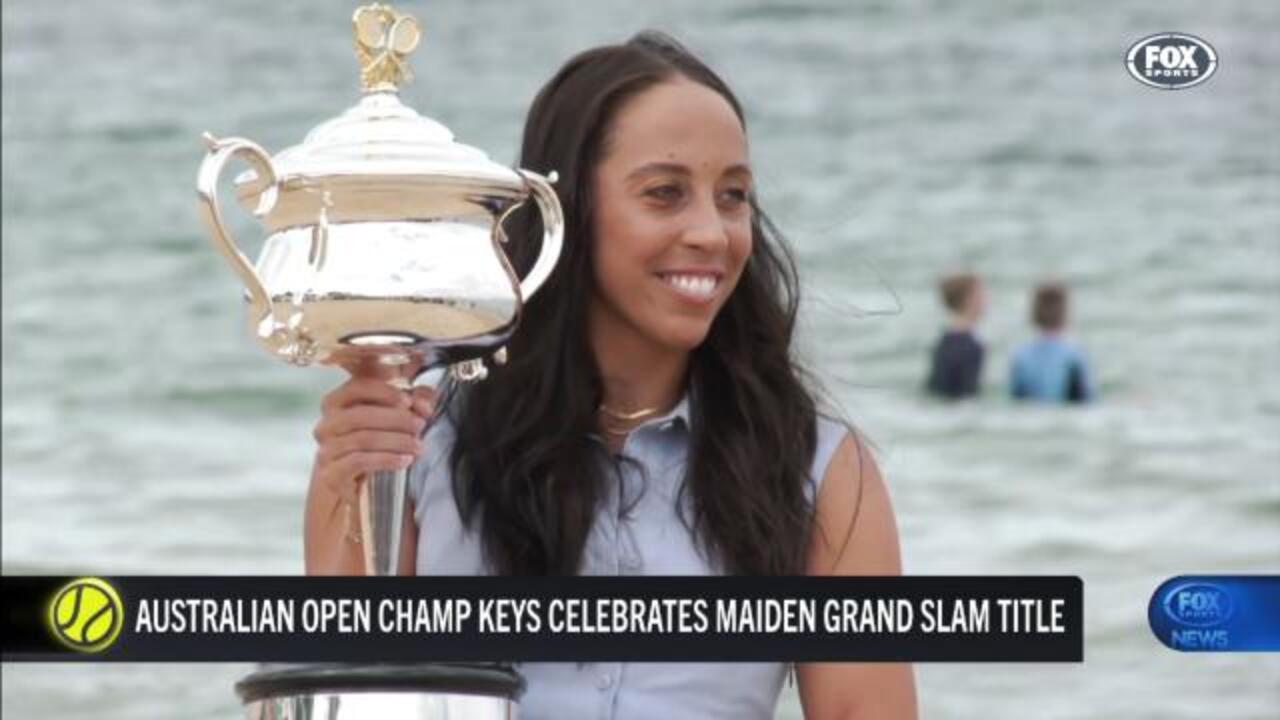
She sought help.
“Lots of therapy,” she said. “I really bought into it. I think in the past I had always tried to go the sports therapy route where it was more about routine and controlling things you can control, and all of that.
“I felt like I was always good enough at that, but to really start kind of digging in on how I felt about myself, and really being honest with myself about it, it was really hard because I didn’t really want to be the person that felt like I was really struggling. But I was starting to really struggle with it. So, just being really honest, and actually getting help, and actually talking to someone, and not just about tennis but about how I felt about myself. Again, very uncomfortable, and I never really like to be uncomfortable, but I honestly think had I not done that, then I wouldn’t be sitting here.”
Why the depth of meaning to the deep-and-powerful forehand on match point? Keys would previously have played safe, hoping Sabalenka missed. She went big. Ye gods. Win or lose, she competed in exactly the manner she sought.
“I almost felt like I was trying to beat her to it,” Keys said of doing to Sabalenka what Sabalenka normally does to everyone else. “If I wasn’t going to go for it, I knew she was going to. It pushed me to thread the needle. I just kept telling myself, ‘Be brave, go for it, lay it all out on the line’. At that point, no matter what happens, if I do that, then I can be proud of myself.”
A key moment – sorry! – came when she served at 4-4, 30-30 in the deciding set. Sabalenka was not so much playing Keys as stalking her, grunting and yelping like she was trying to kill a snake. Rah! Rah! Phwoar! Under intense pressure, Keys would be would typically be well and truly frozen. Now she belted two forehand winners, rah, phwoar, to hold her nerve and serve. Sabalenka despaired. Damsel in distress. Upon defeat, she smashed a racquet, buried her furious face in a towel and sobbed.
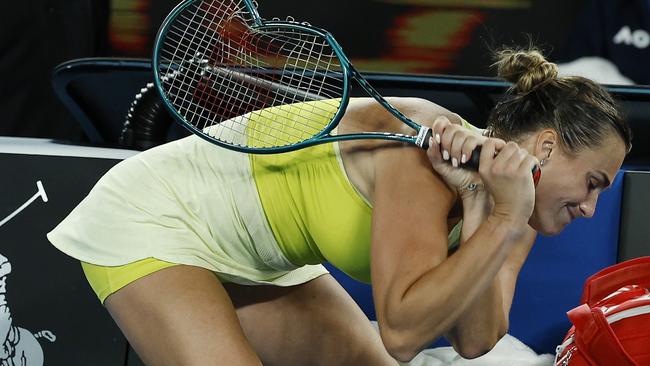
Sabalenka’s anger threatened to overshadow Keys’s crowning moment. The world No.1 disappeared to the locker room for a chill pill, returning a composed and gracious loser, saluting Keys and cheerfully telling her entourage the loss was all their fault.
“There definitely was a bit of frustration. I was so close to achieving something crazy,” Sabalenka said. “When you’re out there, you’re fighting, but it seems like everything is not going the way you want. I just needed that time for myself to switch off and forget it, and let it go and leave it in the past. I wanted to be respectful. I was standing there and I was like, ‘Okay, c’mon. You’ve been in her position. She deserves it. She was the better player than you’.”
Ah, Keys’ grin! The best. She took Daphne on a tour of Melbourne on Sunday. ended up barefoot at Brighton Beach. Life’s better barefoot.
“Last year, even with injuries and some tough losses, I was starting to find myself a little bit more,” she said. “I was more clearheaded and present. I felt like I was starting to get better at problem-solving in the moment.
“In the past, when things started to go awry, I was almost, like, not in my own body. I was kind of looking down at myself. I felt like I couldn’t connect my brain to my body. Last year I started being able to be more in the moment and take each point by point instead of panicking.
“Then through the off-season, I put in a lot of hard work. Things were going more the way I wanted. Things slowly kept building and all of a sudden you’re winning a bunch of matches in Adelaide. Then you’re coming in here …”
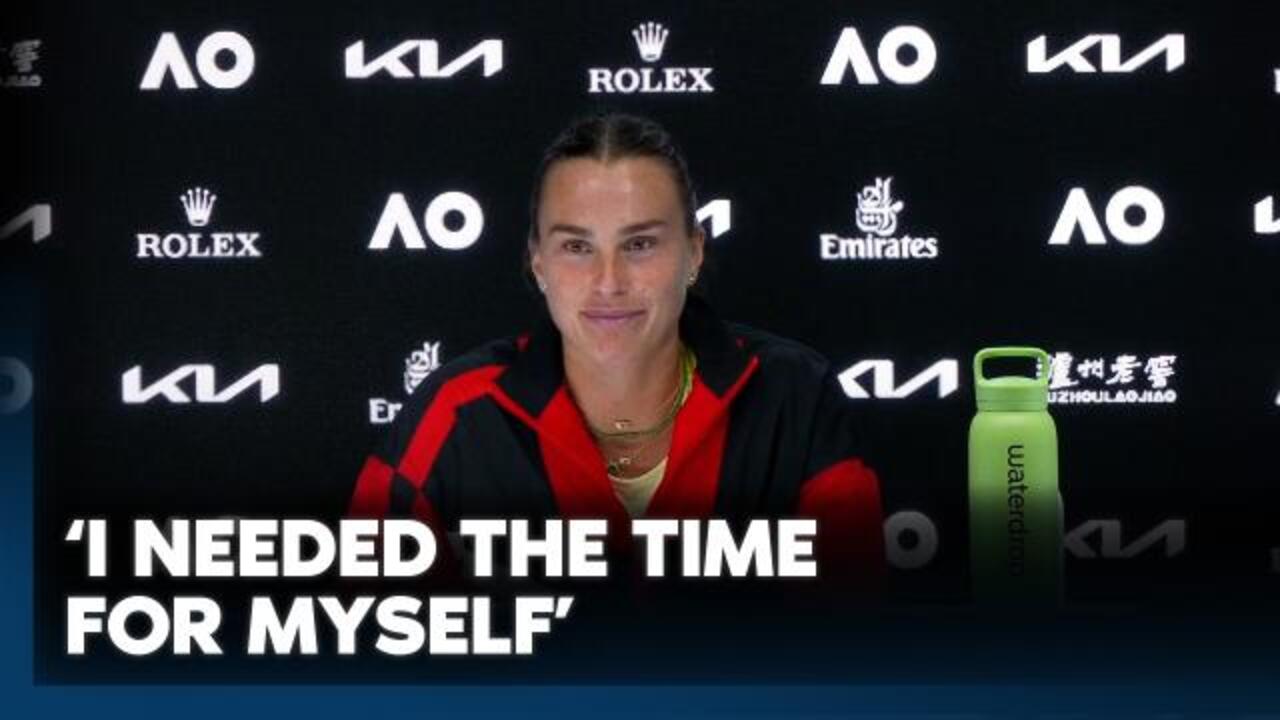
Keys won the Adelaide International. Ditto for the Australian Open. She wanted those victories but no longer needed them. Epictetus must’ve thrown a fist to the sky.
Ash Barty had a similar journey. You let something go and then the universe sends it back. Nothing healthier than honesty about one’s mental health.
“I’d done therapy before,” Keys said. “But it was always too sports-specific. I always went in with the thought of, ‘Will this help me perform better?’ I finally got to the point where I was personally low enough that I was like, ‘I don’t really care if this helps me perform. I just want to feel better.’ It was like, ‘I don’t really care what I have to do, I just want to feel better.’ It was the kind of thing that pushes you to say, ‘Okay, well, obviously whatever I’m doing isn’t working’.”
Keys’s feel-good factor was the highest since Barty’s.
“For a long time in my head I had this idea that people were able to ignore their nerves or doubts or anything like that and tunnel-vision play tennis,” Keys said. “In the past, if I had nerves come up, I typically wouldn’t play as well. It started getting to the point where, when nerves came up, I was thinking, ‘Oh, no, now I’m going to play badly’. It would start this internal panic.
“For whatever reason, I had this light bulb moment where I started buying into the fact I can be nervous and still play good tennis. Those things can live together.”
Help helps.
“The more that we talk about actually using it as a tool, I think people will feel more comfortable with it,” Keys said. “The WTA does a great job in having someone at tournaments you can go and talk to. It’s not only helpful for myself. It’s helpful for a lot of us. The stigma around therapy in general, not just in sports, is slowly starting to go away. I think everyone should be in therapy, no matter what.”
She laughed. It was funny because it was true.
“No matter what, no matter what’s going on in your life, you’re going to have moments where things are tough and you need someone to talk to,” Keys said. “I think it’s very important. It’s something I’ll continue to do for the rest of my life. I think if more people do it, and more people talk about it, then it just kind of becomes the norm. It’s almost as if you’re going to the doctor. No one bats an eye at that. I think it’s just kind of overwhelmingly needed for most people.”


